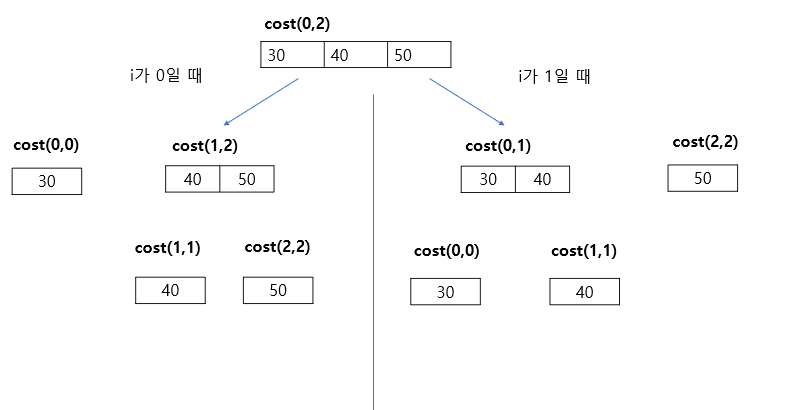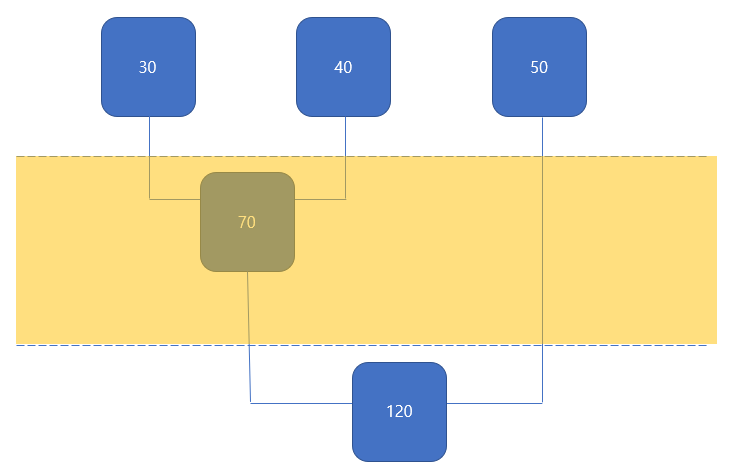X
![]()
11066번 - 파일합치기
이 문제를 푸는데에있어 가장 결정적인 코드는 다음과 같습니다.
// start 인덱스부터 end 인덱스까지의 합성에 필요한 총량
static int cost(int start, int end) {
....
int ret = Integer.MAX_VALUE;//더미값
for (int i = start; i < end; i++) {
ret = Math.min(ret, cost(start, i) + cost(i + 1, end));
}
ret += start~end까지의 파일의 합
....
return ret;
}
함수의 다음과 같습니다.
start 지점부터 end 지점까지 파일들을 합치는데에 필요한 비용
그리고 함수의 내부구현을 보면 다시 자기 자신을 i라는 기준으로 나누어서 재귀 호출합니다.
예시로 다음 그림처럼 메소드가 뻗어나갈 것입니다.
i=1일 때를 보겠습니다.
cost(0,0)은 파일을 합치는 비용이 없으므로 0입니다.
cost(1,2)라면 40 + 50 = 90의 합치는 비용이 필요하게 됩니다.
i=2일 때를 보겠습니다.
cost(0,1)은 파일을 합치는 비용이 30+40 = 70이 됩니다.
cost(2,2)은 파일을 합치는 비용이 없습니다.
문제가 파일을 합칠 때 비용이 최소로 나오게 하라했으므로 다음과 같은 코드가 나오게 된것입니다.
int ret = Integer.MAX_VALUE;//더미값
for (int i = start; i < end; i++) {
ret = Math.min(ret, cost(start, i) + cost(i + 1, end));
}
위의 코드까지는 중간 과정들에 대한 비용이고 마지막으로 start~end까지의 파일들의 합을 더해줘야합니다. 무슨 말이냐면
다음과 같이 위의 코드가 나타내는 것은 노란 박스 부분이고, 마지막에 남은 합성 비용을 더해야 하는데 이는 start~end까지의 파일 합(30+40+50=120)과 같습니다.
재귀 함수를 만들었으니 이 함수에 캐쉬배열을 만들어 반복적으로 계산하는 일이 없도록 합니다.
전체 소스는 다음과 같습니다.
import java.util.Arrays;
import java.util.Scanner;
public class Exam11066 {
static int[] arr;
static int[][] cache;//합성 비용
static int[][] s;
public static void main(String[] args) {
Scanner sc = new Scanner(System.in);
int t, k;
t = sc.nextInt();
while (t-- > 0) {
k = sc.nextInt();
arr = new int[k];
cache = new int[k][k];
s = new int[k][k];
// 입력
for (int i = 0; i < k; i++) {
arr[i] = sc.nextInt();
Arrays.fill(cache[i], -1);
Arrays.fill(s[i], -1);
cache[i][i] = 0; // 파일을 합치는 비용 없음
}
System.out.println(cost(0,k-1));
}
sc.close();
}
// start ~ end까지 합성하는데에 필요한 총량
static int cost(int start, int end) {
//이미 계산된 것
if (cache[start][end] != -1)
return cache[start][end];
int ret = Integer.MAX_VALUE;
for (int i = start; i < end; i++) {
//최소값((시작~i) + (i~끝))
ret = Math.min(ret, cost(start, i) + cost(i + 1, end));
}
ret += sum(start,end);
cache[start][end] = ret;
return ret;
}
//start파일에서부터 end파일까지의 총합
static int sum(int start, int end) {
if(s[start][end]!=-1)
return s[start][end];
int sum = 0;
for (int i = start; i <= end; i++) {
sum += arr[i];
}
s[start][end] = sum;
return sum;
}
}
최근 글
같은 카테고리의 다른 글
- 9933번 민균이의 비밀번호
- 1764번 듣보잡
- 1475번 방 번호
- 1157번 단어공부
- 최소값과 최대값
- 구간 합 구하기
- 최소값
- 1181번 - 단어 정렬
- 11652번 - 카드
- 2169번 - 로봇 조종하기
- 2178번 - 미로 탐색
- 9084번 - 동전
- 2098번 - 외판원 순회
- 11049번 - 행렬 곱셉 순서
- 2302번 - 극장 좌석
- 1495번 - Day of Mourning
- 11060번 - 점프 점프
- 5557번 - 1학년
- 1697번 - 숨바꼭질
- 2631번 - 줄세우기
- 11004번 - K번째 수
- 9507번 - Generations of Tribbles
- 1904번 - 01타일
- 10942번 - 팰린드롬
- 10164번 - 격자상의 경로
- 2011번 - 암호코드
- 11066번 - 파일합치기
- 11054번 - 가장 긴 바이토닉 수열
- 11724번 - 연결 요소 개수
- 11403번 - 경로찾기
- 2667번 - 단지번호붙이기
- 3187번 - 양치기 꿍
- 2225번 - 합분해
- 1965번 - 상자넣기
- 1937번 - 욕심쟁이 판다
- 1890번 - 점프
- 1520번 - 내리막길


